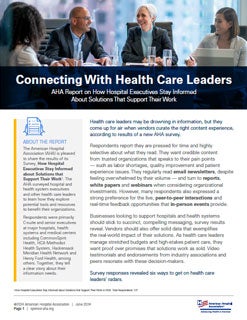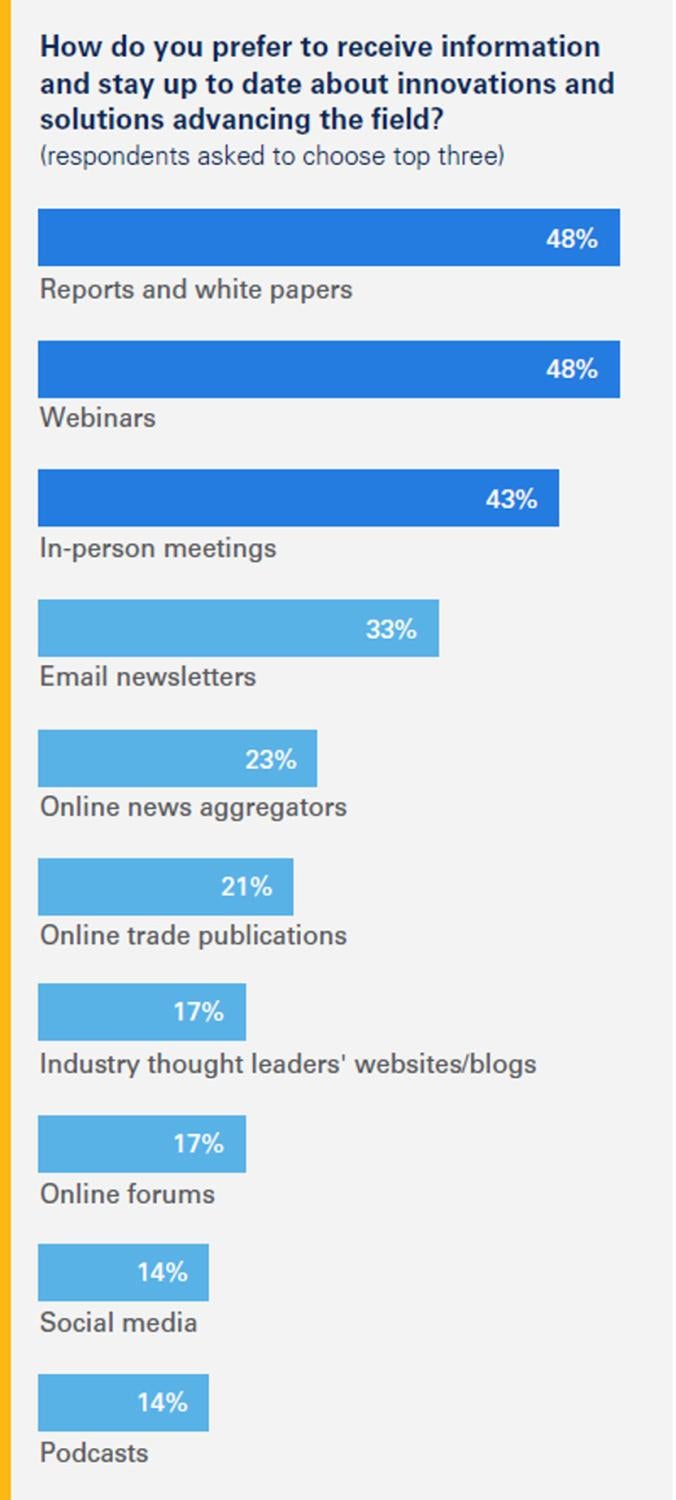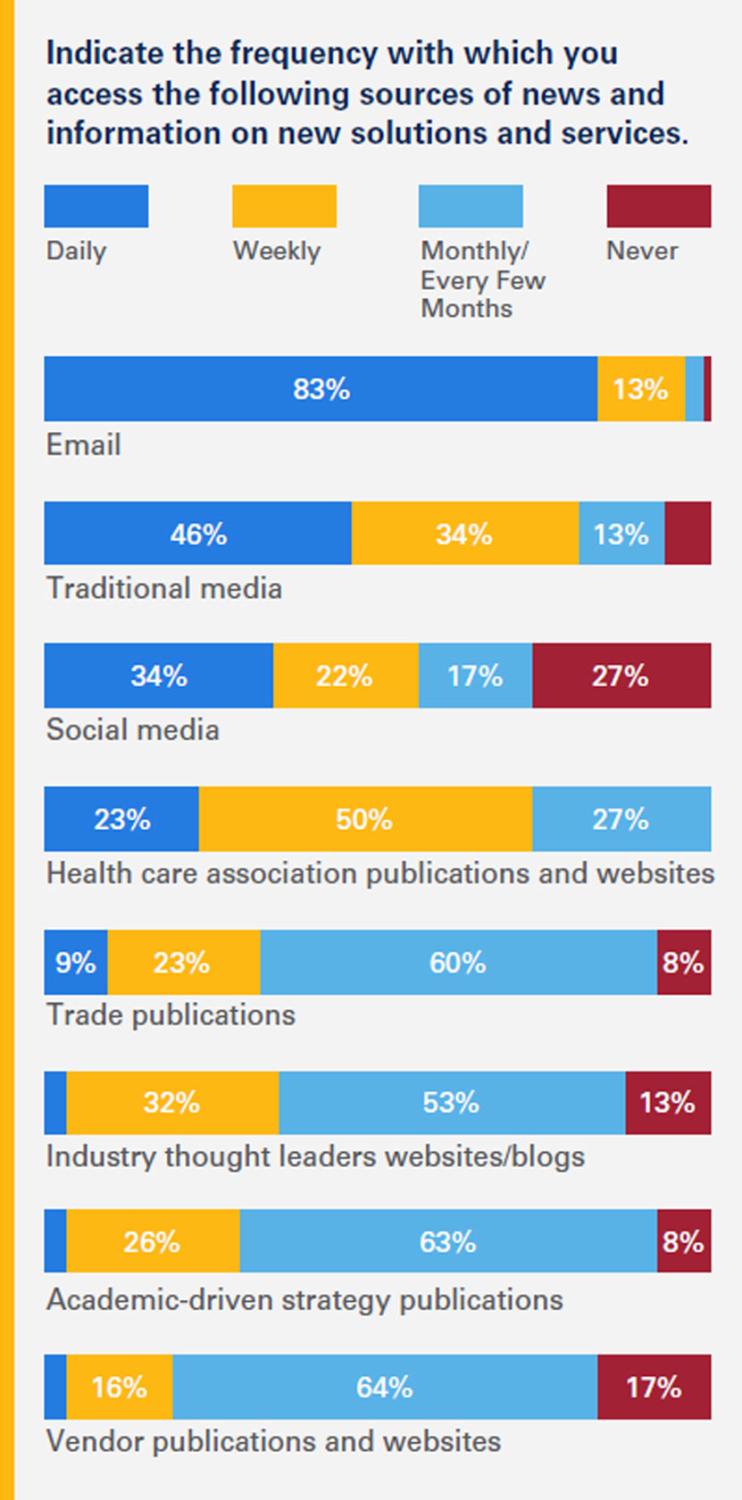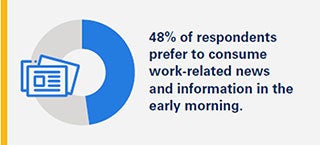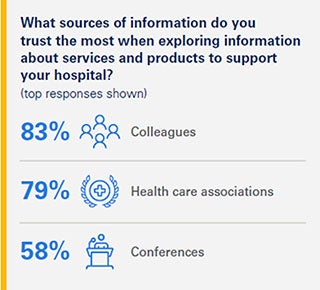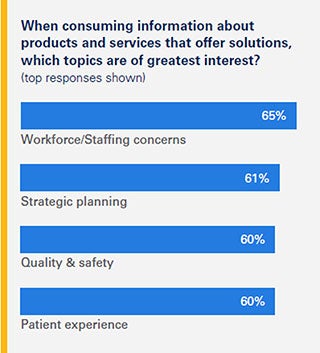Health care leaders may be drowning in information, but they come up for air when vendors curate the right content experience, according to results of a new AHA survey.
Respondents report they are pressed for time and highly selective about what they read. They want credible content from trusted organizations that speaks to their pain points — such as labor shortages, quality improvement and patient experience issues. They regularly read email newsletters, despite feeling overwhelmed by their volume — and turn to reports, white papers and webinars when considering organizational investments. However, many respondents also expressed a strong preference for the live, peer-to-peer interactions and real-time feedback opportunities that in-person events provide.
Businesses looking to support hospitals and health systems should stick to succinct, compelling messaging, survey results reveal. Vendors should also offer solid data that exemplifies the real-world impact of their solutions. As health care leaders manage stretched budgets and high-stakes patient care, they want proof over promises that solutions work as sold. Video testimonials and endorsements from industry associations and peers resonate with these decision-makers.
Survey responses revealed six ways to get on health care leaders’ radars.
1 Let Results Speak for Themselves.
Bring on the experience-based data and testimonials. Respondents cited a need for more critical reporting around solutions and their performance, rather than marketing information on what a product “should” do. Leaders said they prefer “Outcome studies vs. opinion” and want more product comparisons.
“Testimonials are always good. I like to hear from real-life consumers and their experiences.”
- Respondent
“I would like to see a summary of the resources with the competitors outlined similar to Consumer Reports, something that cuts through the sales pitch.”
- Respondent
2 Get to the Point.
Leaders indicate that they don’t want to sift through promotional information to get to the truly valuable content, and would prefer content be served up without the clutter of advertising. For example, websites that feature pop-up ads may distract from the reading experience.
To avoid this, consider sponsoring articles in publications that don’t heavily rely on advertising revenue. Association newsletters or thought leadership reports may offer a more streamlined approach.
“Keep the advertising off the face of the articles. Show the complete story,” said one respondent.
Leaders cited a need for concise, factual information, such as infographics or executive summaries that quickly capture key points.
While some respondents prefer visual mediums over lengthy text, most say they favor webinars, reports and white papers when consuming information.
“Keep it brief and factual.”
- Respondent
3 Connect Them With Peers.
Executives clearly value the live connections found at in-person meetings, conferences and webinars. Consider positioning your company as a facilitator of these valuable conversations.
“I appreciate affordable and relevant opportunities for in-person information exchange and networking opportunities. I feel there is no substitution for immediate and real-time feedback.”
- Respondent
“Whether it's delivered via an intimate roundtable or a national conference, hospital executives tell us face-to-face peer networking is highly valuable for vetting solutions.”
- Julie Doyle, Vice President, Marketing, AHA
4 Diversify — and Time — Your Outreach.
Email remains a reliable way to reach leaders, as nearly 83 percent of respondents check it daily. But as you personalize your messaging, consider sending it in the early morning hours — respondents overwhelmingly prefer to consume work content before the demands of the day ramp up.
While leaders’ opinions on social media’s value differ, survey results show that brands should not rely on social media as their only outreach channel. Thirty-four percent of respondents check social platforms daily, but nearly 27 percent completely ignore it.
Instead, consider a multi-channel approach that includes both digital outreach and opportunities for face-to-face engagement. Look for ways to create or sponsor events, roundtables or online forums that bring together opportunities for informal discussion.
“I stay informed on LinkedIn, as well, but it is too oversaturated with sales personnel.”
- Respondent
“Email remains a powerful communication channel for this audience, which is why our targeted campaigns are so effective for partners.”
- Kathleen Wessel, Vice President, Business Management, AHA
5 Add Credibility.
Respondents indicate that when it comes to exploring new products or services, they place the highest trust in their colleagues, peers and industry associations. Consider partnering with these influential sources to enable peer-to-peer discussions and testimonials around your products or services.
“Our state hospital association provides pertinent information live, [which is] very helpful.”
- Respondent
“The AHA’s new survey offers valuable insights into how hospital leaders stay informed and the role trusted partners can play in supporting their work.”
- Julie Doyle, Vice President, Marketing, AHA
6 Target Their Interests.
Leaders understandably want informative content that addresses workforce issues, strategic planning, quality and safety, and the patient experience. Develop targeted content that speaks to these challenges and shows how your offerings provide relevant solutions.
By delivering succinct, data-driven content through trusted channels — while facilitating valuable personal connections and speaking directly to hospital leaders’ top priorities — businesses can cut through the noise and establish themselves as credible partners in supporting health care organizations’ success.
“I would like a Cliff Notes version [of long-form content] and possibly a push of information based on interests or identified needs. Health care is challenging, and time is limited.”
- Respondent
Connect with us
Want to partner? Let's talk.
Whether you're looking for business partner opportunities, hospital solutions, or just want to let us know how we did, you can contact us. Please provide the following information:
1 How Hospital Executives Stay Informed about Solutions that Support Their Work in 2024. Total Respondents: 127
